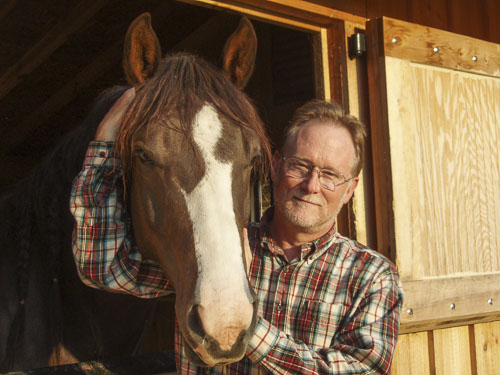
.
Entropy
Knowledge
is to understand
the differences;
wisdom
is to bridge the
common ground.
Suspenders and
suspense, for example:
shoulder to shoulder
but otherwise unattached.
Which is the one
to learn from?
Even on our worst day,
we can draw abstractions
from the concrete.
Even an unanchored
suspension bridge
can be easily supported
by the simple suspension
of our disbelief.
But abstractions leave us
none the wiser.
Let’s get practical here.
The river is beautiful
only until
we have a need
to cross it.
The river is ugly
only until
we reach
the other side.
Back and forth
we go.
The earth is as much
pendulum as ball:
so even the
peaceable kingdom
will know a day
of slaughter.
And another.
And another.
Progress, it seems,
takes us nowhere
we haven’t already been.
The earth is as much
pendulum as ball.
The river is beautiful,
the river is ugly,
but the river is not
the flooded landscape or
the drought-cracked bed.
The river is only the river.
The pendulum
slows,
revealing every star
as finite.
Fire reduces
half the universe to ash;
what’s left will freeze
into atomic dust.
Don’t wait for the sun
to fill the sky.
If there’s a worm hole,
take it.
Remember that
shade tree
in your old back yard.
You’re there now.
Stay a while.
.
If Left Alone
every blade
unsharpens
over time
every color fades
toward neutral
every fruit drops
every drop dries
every strength
falters
every breath
every light
goes out, and
every memory,
good or bad,
is lost
I am now here
or
I am not here:
two states
separated by
one letter,
one infinity
of difference
which is the one
to celebrate?
which is the one
to mourn?
.
On Claudia’s Birthday
Friends aren’t what they used to be.
The circle has widened beyond
all horizons, and now people
we don’t know
wander in from the street
to rummage through drawers
and stare into the refrigerator.
In this third year after her death,
Claudia, or the fact of her,
prompts the ghosted internet
to tell the world
that it’s her birthday.
That’s not inaccurate, of course:
beginnings are indelible.
But still.
Old-fashioned friends, who know
a platform is no place to live,
send love and share the grief.
But here and there among the posts
the clueless barge right in:
Do something special today!
one tells her.
Have a fun week! says another.
Many happy returns!
Someone sends a birthday song.
A winking smiley-face.
Claudia herself
might have laughed off
these misplaced hints of immortality.
But who’s to say?
Every form of parchment
fades in constant light;
what once was clear becomes illegible.
Now we see through a glass darkly
and then darker still.
No doubt this same congratulation
will make the rounds again next year.
When you see it,
remember the snuffed light
of blown-out candles.
Think how much you’ve lost.
.
When Death Comes Knocking in the Night
Oh, you again, I say.
The terror has worn thin.
Habit teaches us to live
with anything, I guess —
the way I stopped worrying
about the atomic bomb
in sixth grade
after the fiftieth false alarm,
all us kids huddling
beneath our desks,
waiting for the final flash.
He still leans on that famous
scythe — a habit of his own.
I think he carries it
only to scare the children,
to keep them at a distance.
He’s not such a bad guy,
just lousy at making friends.
And in spite of what
you may have heard,
he’s terrible at chess.
He’s cool about it, though —
whether it’s a thousand
or ten thousand games,
one win is all he wants.
Our routine is almost playful now.
Stop me if you’ve heard this,
he says. But he never stops.
How many dead people
does it take
to change a light bulb?
He grins his trademark grin.
The number doesn’t matter!
he howls.
There aren’t any light bulbs
in the grave!
Then he cackles like a
drunken sorority pledge.
The humor, he believes,
lies not in the joke itself,
but in the way he tells it.
He tells it repeatedly.
How many dead people
does it take
to change a light bulb?
he asks again.
This is the only joke he knows;
for him it never gets old.
But for once I surprise him.
The number doesn’t matter,
I interrupt.
Dead people can’t climb a ladder.
Death gapes at me,
eye sockets wide,
grinning uncertainly
at my departure.
But the third time,
inspired, as he often is,
by the breaking of fresh ground,
he tries a variation of his own.
The number doesn’t matter!
he cries with sibilant glee,
The dead don’t need light bulbs!
They’re dead!
He thinks he’s hysterical
and laughs so hard
he unhinges his jaw.
How many dead people
does it take,
he begins again.
This goes on for a while.
He’s on a roll now,
as possibilities unfold
without end.
Eventually, boredom sets in.
I tell him I’m still listening,
that I’ve closed my eyes
only to concentrate
on his infinite comedic range.
I tell him his eternity
of punchlines is amazing.
I think he buys it.
How many dead people
does it take,
he intones
for the umpteenth time,
but I’m drifting away,
forgetting the joke entirely.
I ease down
through the sweetness
of the shadow.
Words release me
from their mystery,
and I sink, dreamless,
toward the usual slumber,
not knowing
how long, or how deep.
— Clint McCown
.
Clint McCown has published four collections of poems and four novels, the most recent of which, Haints, received the Midwest Book Award. He directs the MFA program at Virginia Commonwealth University and teaches in the Vermont College of Fine Arts low-residency MFA program.
.